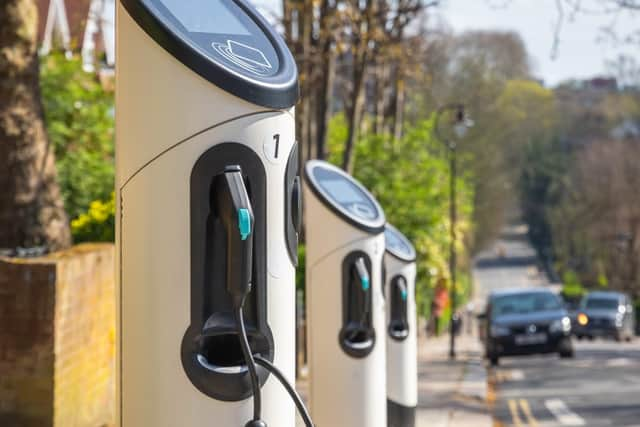Charger roll-out needs to be five times faster to avoid EV blackspots


The UK must rapidly accelerate its roll-out of public EV charging points or risk missing its climate targets and leaving drivers in some areas stranded without infrastructure, according to a leading think tank.
The Policy Exchange think tank said the UK will need 400,000 public charge points by 2030 to meet demand created by the ban on new petrol and diesel vehicles. Currently there are around 35,000.
Advertisement
Hide AdAdvertisement
Hide AdThe think tank’s report said that the rate of installation will have to increase five-fold, from 7,000 over the last three years to 35,000, in order to meet demand. Otherwise, it warned, some areas will become “charging black spots” where drivers struggle to gain access to public charging facilities.
It highlighted the regional differences, particularly between well-provisioned urban areas and rural areas where there are far fewer chargers.
Research earlier this year found that local authorities around the country intended to install a total of just 9,317 charge points by 2025.
The Policy Exchange report calls for the Government to speed up the process by allowing private firms to install and operate charge points in areas of low provision. Under the proposal they would be guaranteed a minimum annual income but also forced to adhere to a price cap, to avoid operators exploiting local monopolies. This would replace the current grants issued to local councils.
Advertisement
Hide AdAdvertisement
Hide AdThe report also recommends that local authorities create “chargepoint teams” dedicated to facilitating the roll-out of chargers, and calls for a simplification of access to chargers so drivers aren’t forced to have multiple payment accounts with different providers.


In the foreword to the report, Conservative MP Simon Clarke said: : "Whereas a driver of a petrol car can travel confidently from Land's End to John O'Groats, knowing that they can refill the tank every few miles, that is not yet the case for EVs.
"Some areas have naturally built up impressive coverage, such as central London, but vast swathes of the country have not.
"This important report sets out a way to meet the challenge."
Advertisement
Hide AdAdvertisement
Hide AdThe RAC’s Rod Dennis said the report highlighted the danger that charging infrastructure could face the same problems as the roll-out of broadband, which saw some areas lagging far behind others in provision.
He said: “In time, many drivers will benefit from a full charge before they even leave the house thanks to home charging. But this is only part of the solution as those without off-street parking may struggle to charge from home for some considerable time so it is vital we have a network of ubiquitous, reliable and easy-to-use public charge points. Having a sufficient number of charge points will also become especially important in those rural areas of the UK that see large annual influxes of visitors by car in the summer months.
“Everyone remembers what happened when broadband started to be rolled out and some areas were left with poor connections. It would be a major policy failure if something similar happened in the next few years with communities missing out on good charging provision.”
